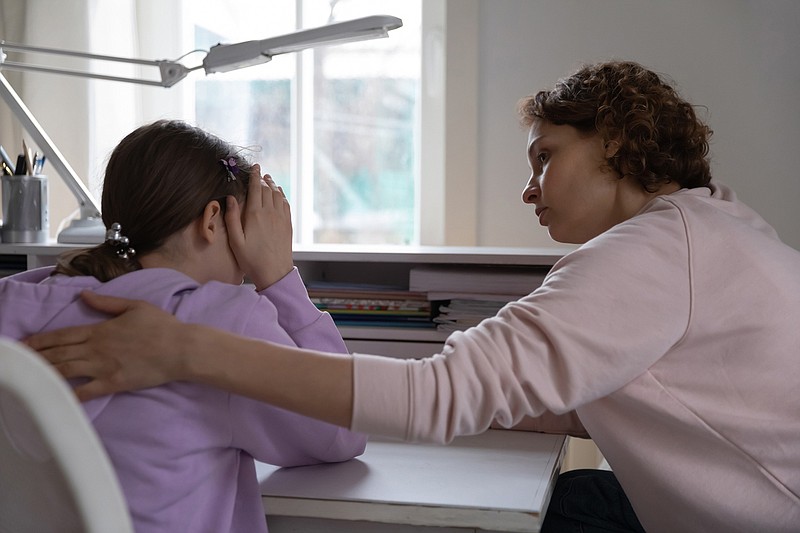My friend and podcast partner John Duffy, a family therapist, likes to tell parents they were never teenagers. Not by today's definition.
The pressure to succeed socially, emotionally and academically in a world that's constantly connected yet crippled by loneliness; globally conscious yet bitterly divided; shaped by two decades that included the Sept. 11 terror attacks, our nation's longest war, a trio of impeachment proceedings, a historic push for racial justice, an insurrection at the U.S. Capitol, a pandemic - and a sophisticated disinformation campaign to confuse their young minds about all of it?
Yeah, we never dealt with that.
We worried about who to ask to homecoming. They worry about who to ask to homecoming, and whether homecoming will be canceled again because a virus that spreads in close quarters is still killing around 1,500 Americans per day. Many of them also worry about climate change and gun violence and voting rights and the skyrocketing cost of college and an ever-shifting job market and other topics that will define their adulthoods to a far greater degree than they defined ours.
This is not to say teenagers haven't endured difficult childhoods or tumultuous backdrops in previous generations. This is to say that many teens possess an emotional awareness of the world around them that a lot of us lacked interest in or access to. And they have TikTok, which is clever and joyful and fun, but also a force multiplier - making problems feel inescapable and offering kids a tool with which to constantly measure themselves against their peers. Their peers' reactions and fears about the world around them, but also their peers' talents and homes and body types and all the rest.
It's a lot.
Recently I asked Duffy how parents can best help their kids through a world that feels intent on breaking their spirits and their hearts.
"I wish that every parent had the opportunity to go to grad school in psych, and I'm kind of joking and kind of not," he said. "Because one of the main things we learned is to shut up."
Duffy said families usually come to him as a group before they split up for individual counseling sessions. Teens often open up pretty quickly and reveal loneliness or bullying or anxiety.
"No parent wants this for their kid," Duffy said. "So they do what people naturally do. It's kind of like the war room. 'OK, do this. Try this. If only you would just host the thing, then of course people are going to show up.'"
Which leaves kids feeling even more alone in their suffering, and now judged for not doing enough about it.
"It's very hard not to jump in and say, 'Yeah but you're just sitting in your room! If you would just go out! Go to the football game! That's easy! You're going to see people there!''" Duffy said. "And fine. That may be true. But if a kid's not heard, they're going to know - and they're going to be right - 'You don't really get it. You're not hearing me here. I'm having a really hard time.'"
It's also true that physical activity and the company of peers and a change of scenery can cushion the blow of setbacks and reduce feelings of isolation and do wonders for a kid's psyche. Of course we parents want to nudge our kids toward solutions.
But first we should listen. And listen to understand, the way we would in a lecture hall or during a new Netflix series. Because we don't know what they're going through. We haven't seen this show before.
In a moment of serendipity, on the same day I talked to Duffy, a Smart Dating Academy meme popped onto my Instagram feed about dismissive versus empathetic listening.
Dismissive: "The same thing happened to my friend."
Empathetic: "How did that make you feel?"
Dismissive: "What if you try this?"
Empathetic: "That sounds heavy."
Dismissive: "I totally get it. One time I "
Empathetic: "Tell me more about that."
The meme was adapted from a July 2020 Keeley Shaw article in The Mighty.
Is it possible, I wondered, that good dating advice is also good parenting advice?
I texted Duffy. He said absolutely. It all comes down to active listening. Listening to hear and learn, not to jump in and fix. There's not a human relationship that wouldn't benefit from more of this, he verified.
In our genuine desire to help fix people, we often rush the conversation back to ourselves - our ideas, our experiences, our favorite book on the subject. We mean well, but we sometimes leave behind the person who came to us in pain.
Where our kids live now? We haven't been here before. They haven't either. It's new to all of us. One goal that feels clear to me is to go through it together, side by side. To not leave our kids behind or alone, as they navigate these uncharted waters.
To remind them, with the words we say and the ones we don't: "I hear you. I'm not going anywhere. We're going to get through this together."
Heidi Stevens is a Tribune News Service columnist. You can reach her at [email protected], find her on Twitter @heidistevens13 or join her Heidi Stevens' Balancing Act Facebook group.
Tribune News Service

